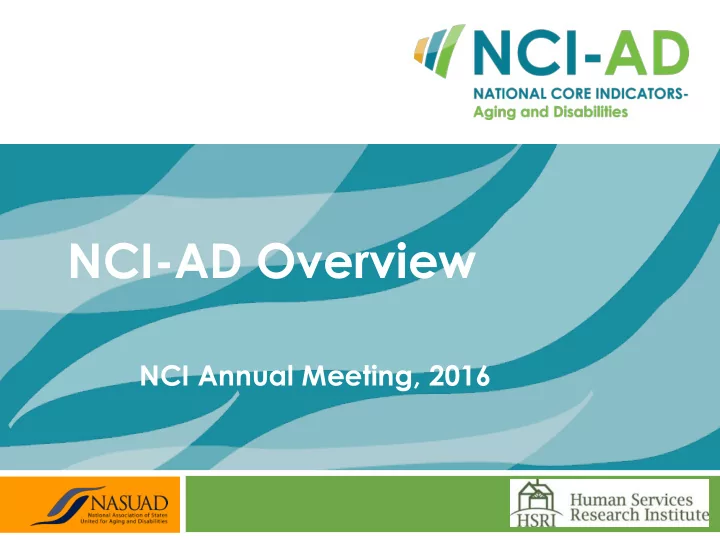

NCI-AD Overview NCI Annual Meeting, 2016
What is NCI-AD? ■ Quality of life survey focused on older adults and adults with physical disabilities ■ Assess outcomes of state LTSS systems MLTSS populations Skilled nursing facilities State-funded programs, and Medicaid waivers Older Americans Act programs Medicaid state plans ■ Gathers information directly from consumers through face- to-face interviews ■ State-developed initiative ■ Relative of the ID/DD systems National Core Indicators (NCI)
Measures Community Work/Employment Participation Rights and Respect Choice and Decision- Health Care making Medications Relationships Safety and Wellness Satisfaction Everyday Living and Service and Care Affordability Coordination Planning for the Access Future Self-Direction of Care Control
Adult Consumer Survey ■ Pre-survey Form Used to setup interviews, for use by the interviewers only ■ Background Information (21 questions) Demographics and personal characteristics: gathers data about the consumer from agency records and/or the individual ■ Consumer Survey (90 (51 proxy) questions) Includes subjective satisfaction-related questions that can only be answered by the consumer, and objective questions that can be answered by the consumer or, if needed, their proxy ■ Interviewer Feedback Sheet Asks interviewer to evaluate the survey experience and flag concerns
What Sets NCI-AD Apart? ■ States own — and have immediate access to — their own data ■ Can be used across settings and funding sources ■ States can add questions to the survey tool ■ Can provide state, program, and regional comparisons ■ Crosswalks to NCI (ID/DD) measures ■ Focuses on how consumers experience services and how services impact their quality of life ■ Goes beyond service satisfaction ■ Provides transparency and accountability ■ State and National reports are publicly available online ■ Provides timely and actionable data over time
Funding Mechanisms ■ Medicaid Administrative Match 50% reimbursement ■ Older Americans Act Administrative funds ■ Using the State’s External Quality Review Organization 75% reimbursement ■ Balancing Incentive Program (BIP) ■ Money Follows the Person (MFP) ■ Grant Funding ■ State funding mandated by statute
History and Development 7
Project Development and Launch 2015-16 Mid-Year 13 state- Steering Report specific Committee released; reports for established NCI-AD.org 2015-16 NCI-AD will be and survey survey website dev. began finalized launched available Dec Jun Jan Mar Jun Jun Jun Dec Jan 2012 2013 2014 2015 2015 2016 2016 2016 2017 1 st year of 2 nd year of NASUAD 2015-16 Pilot surveying Board surveying national survey in launched in voted to began June 1 st report GA, OH, begin work 13 states with 3 new will be and MN on NCI-AD states available
Validity and Reliability - Extensive revision and testing - Validity Face validity Content validity Concurrent validity Cognitive testing - Reliability Internal consistency Inter-rater
State Participation 2016-2017
How States Use Data
Using NCI-AD Data ■ Quality improvement efforts (CQI framework) ■ Compliance – Olmstead planning, BIP, MFP ■ Benchmarking and comparing data nationally ■ Identifying service needs and gaps ■ Allocating services ■ Budget justifications to state legislatures ■ Communicating with family and advocates
Quality assurance in managed care 13 ■ Process measures: choice, control, access to community and safety ■ Pre-MLTSS data can be used as a baseline before the transition ■ United HealthCare’s Proposed MLTSS Quality Framework ■ Includes measure from NCI-AD, state-specific measure, and federal regulations ■ http://www.nasuad.org/sites/nasuad/files/UHC%20NAB%20 White%20Paper.pdf
New HCBS Requirements ■ Many states are using NCI-AD data to demonstrate compliance with the new HCBS Settings Requirements ■ Data may also be useful for quality management activities with the Person-Centered Service Planning Requirements
NCI-AD Process
Timeline June 1 st May 30 th 6+ months December Planning Data Due State-by- Survey Year State and Begins National Reports Issued
Expectations for Incoming States ■ Commit to technical assistance year and 1 year of surveying ■ Develop a project team and contact state agency partners (Medicaid, Aging, and Disability) ■ Monthly technical assistance calls ■ Determine target populations and sample design ■ Contract with vendor or develop team to conduct interviews ■ Gather pre-survey and background information from administrative records ■ In-person interviewer training ■ Send data to HSRI through ODESA ■ Review state report ■ Data are published on www.nci-ad.org
NCI-AD Website www.nci-ad.org Houses: ■ Project overview ■ Reports ■ Webinars ■ Presentations ■ Staff contacts ■ State-specific project information
Data powered by HSRI Project managed by NASUAD For Additional Information: Julie Bershadsky , NCI-AD Project Director, HSRI jbershadsky@hsri.org Kelsey Walter , NCI-AD Project Director, NASUAD kwalter@nasuad.org
Recommend
More recommend